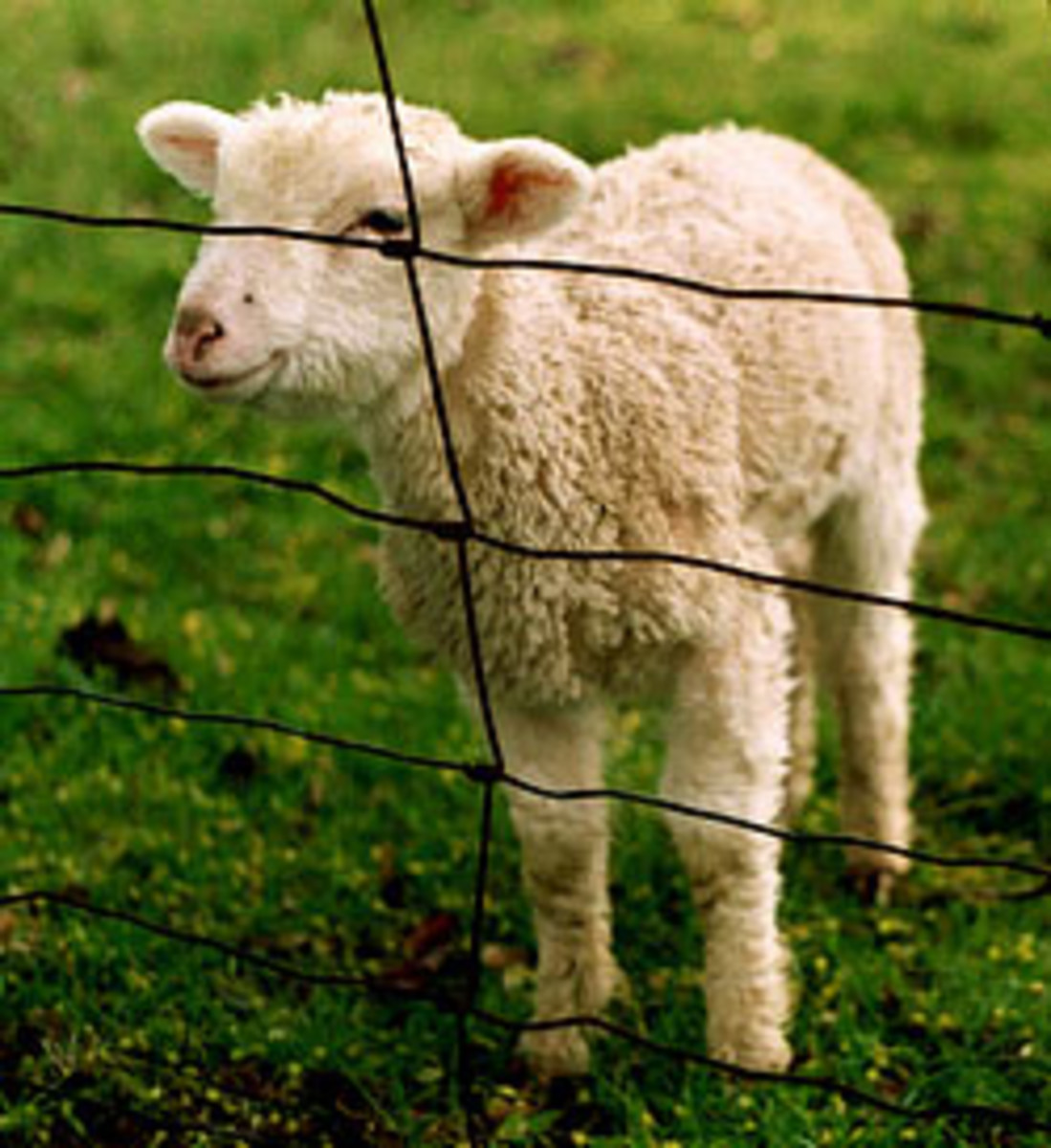Keyword Research for Beginners
The first hub I ever wrote, I looked at the FAQ's and read some very helpful hubs and hints from all over the place. I kept seeing Keyword research. I swear I could hardly understand what this meant. I asked myself, "What are keywords?" My self did not answer. My first Keyword research started several months ago.
I launched a concerted search for the definition and understanding of what a keyword is. I found so many articles, hubs, forums entries, Google search results, that my mind was a blur. I tried to find the secret. I even contacted my Buddhist friend who always seeks the truth in order to see if there was a way to find the truth. He told me that all things in life are temporary. I pondered that for some time. Then I realized that maybe he did know a secret.
After many weeks of making a big deal out of something that is not a big deal (I sometimes specialize in that) I came to the conclusion that a keyword, is just a word. Nothing more. That given the correct situation, any word can be a keyword.
For example, 100 people were surveyed and asked the question, "What is your favorite color?" 85 said blue. If you were to use colors as a way to engage these people, then blue would be a keyword. Everyone will know this and so anyone wanting to connect with those 85 people would use the keyword blue. Since there are 500 people trying to gain the attention of the 85, there would be a possibility of having 500 different ways of presenting the color blue to the 85. 10 of the 500 make most of the connections. Those 10 get the attention of the 85 most of the time and on a daily basis. In order to get my share, I have to have something that can compete with this. I try all kinds of blue approaches, but only one or two of them look at my blue article a week. Most of the 85 stay with the top 10, who continue to bask in the glow of the 85 people's attention.
It is hard to break into the ranks of the top 10. The views they get from the 85 tend to keep them ranked high and indexed pages ahead of a newcomer who has no ranking to speak of, nor is there any indication of a rising index.
Search Engine Optimization
So I asked the question of myself, "How do you get started?" I then spent a lot of time trying to figure out how to go about this. Through forums, hubs, etc., I discovered the Google Keyword Tool.
With this tool, you can type in a word or website and it returns a list of possible keywords and how many times they are searched for and what the competition for the word is, etc. You can also put in a website and look at the keywords they are competing for.
So I started using the keyword tool in the most unimaginable prehistoric way. I would put in a word, and look at the statistics for that word and then I would write down the words that had lots of searches and about how many and then I would have a list.
Of course, I was going about it in a unsophisticated way. Let's face it, I am still far from sophisticated in the Keyword research game. I couldn't use the complicated schemes that I read about, because I could not understand them. Most of the Keyword tool looks like Greek to me and so I am not ready to use the sophisticated aspects of the tool. I needed to stick to some basic things.
I had to and still have to remind myself that this part is not that complicated, it is just words. So I set about devising a strategy that has some positive results with minimal effort. I want to share that strategy for beginners who are as lost about this whole thing as I am. The only way I could cope with this whole idea is to come up with my own private way of dealing with this phenomena.
Step 1: Choose a Title
Don't just name something unless you have no plans to promote your hub or make money from it. Spend time with the name, it is your baby, you want as much attention as you can get.
I am working on a hub about buying a blender for parties. The idea is to choose a blender that will be fun and functional and could be the hub of a party, mixing fun crazy drinks and making that a big part of the fun.
So I started with what I thought would be a good title:
Buy the Best Blender for Fun Party Drinks
To make sure that this is a good title, I used Google's Keyword Tool and put it in. The first thing to do is find the tool.
Go to google search and type in: Google Keyword Tool
Press return, and click on:
Keyword Tool - Google AdWords - Online Advertising by Google
Once you arrive at the Keyword Tool page, you may be asked to enter a captcha, a captcha is the goofy mix of letters and numbers in different fonts that prevents spamming of the site and provides security.
You will see a screen like the one below.
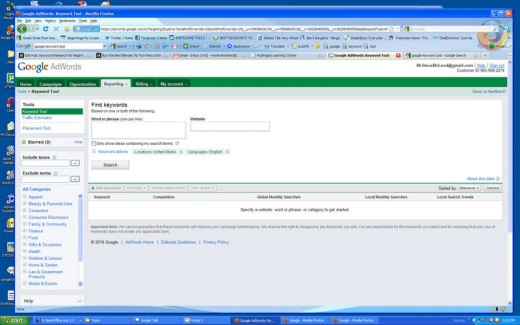
Type in the Name You Want to Use
The first thing you do is type in the Title you want to use in the box that says "Find Keyword" and the click on search.
Easy so far, right? Okay, the next thing you want to do choose to display the columns that are helpful to you as a beginner. This is not a time to overthink the process, just follow along and see if it makes any sense.
The screen shot below shows the Find Keyword box with the title entered.
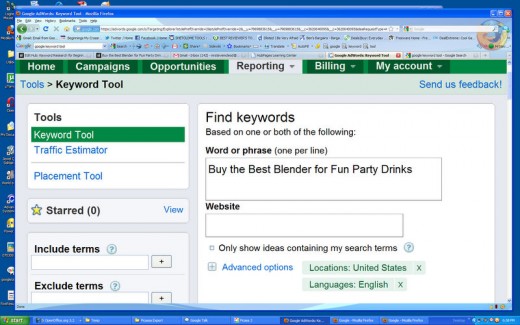
Choose the Columns to Display
To start with, click on the columns button on the right top, when the dialogue box comes up, click on only two things and unclick all others. Click on Global Searches and Estimated Avg. CPC.
Global Searches reveals the number of searches have occurred over the months for the keyword. These are keywords typed in by people searching for your topic and related topics.
CPC is the Cost Per Click. Cost per click is the amount an advertiser pays when the visitor is directed to the advertiser's site.
You can see how these might be important.
In addition, scroll down to the left side and choose exact match in addition to broad in the Match Types.
The screen below demonstrates these settings.
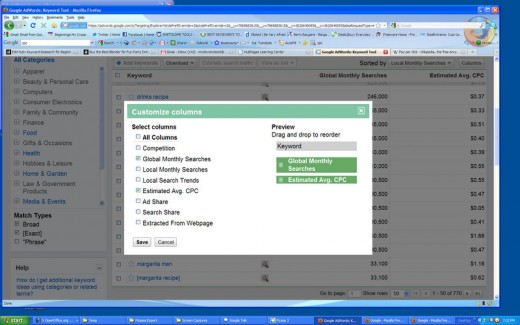
Start Looking at the Results
Now is the time to start looking at the results. You want to choose Keywords that have a solid global searches and high CPC. Go through the list and click the boxes that relate to your topic the best.
I like to choose words that have search result not too small or too large. Simone recommends 500 to 40,000. Who am I to argue? I make exceptions for keywords that I like a lot, even though it may not be the best strategy, I just can't ignore them.
The first thing I notice is that there are no searches for my title. I should be able to rank very high on that, but who wants to? I need a title that might be searched for once in a while.
The Next thing I notice is that there are a lot of keywords relating to recipes.
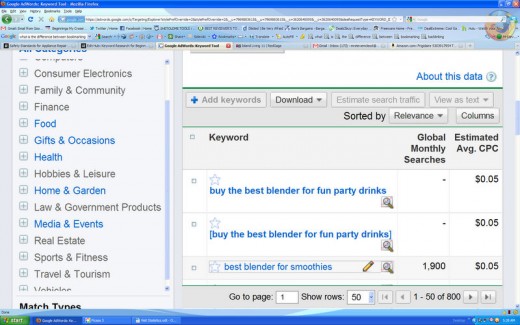
Choosing Words That Have Some Interest
Ok, I went through the list and chose about 20 to think about. You can do this by clicking on the little square next to each word you like. Then there is a great feature that lets you download the words you selected to a spreadsheet. In the spreadsheet, you can sort and re-sort the words you have selected. I generally have to do this several times before I am 'inspired' with a new title.
Keywords I Chose and Downloaded to Spreadsheet
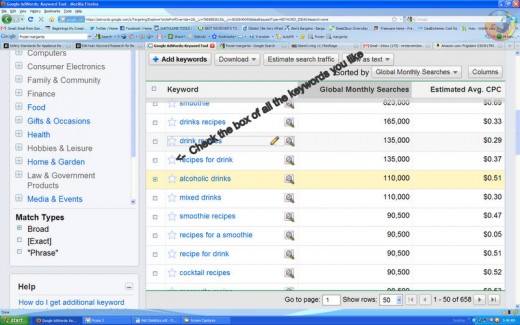
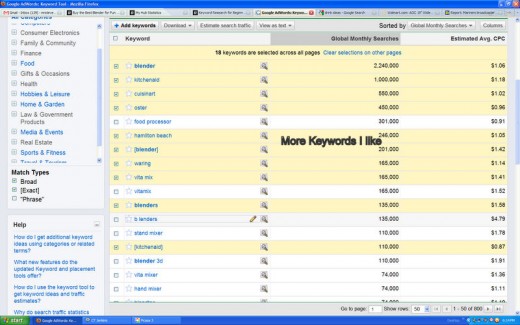
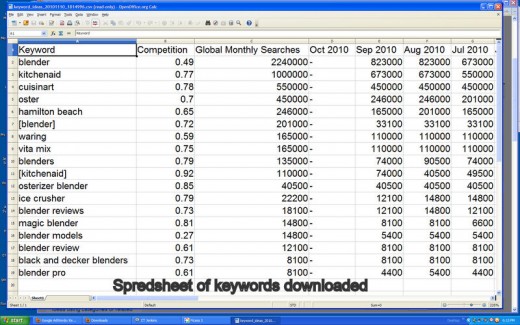
Examine the List
Remembering the rules for selecting based on searches, I can easily see that there are only some that meet the requirements of 500 to 40,000. Others who do keyword research believe that some keywords below 500 are still viable. I agree, some 200 searches keywords are well performing. That's why I say, "There are words I cannot ignore just because I like them and maybe they pay well."
I am thinking now that I should try some simple titles:
Best Blenders
top blenders
blenders for drinks
blenders for frozen drinks
drink blenders
party blenders
blenders for parties
buy the best blender
how to buy the best blender
best blenders for drinks
best drink blenders
drink blenders
what blender should I buy?
what is the best blender to buy
buying a blender
best blender model
top blender model
buy a blender on line
I put all these in the search box in keywords and check the box 'only show ideas for my keywords' and get the following results.
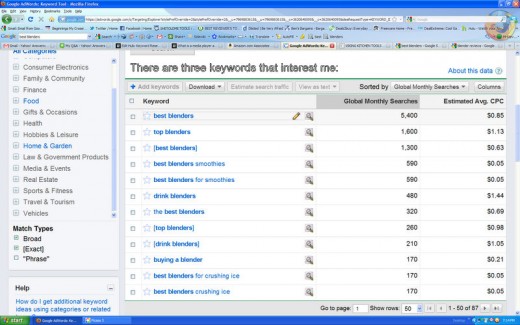
Make a Choice
I decide that I like two keyword searches: Best Blenders and Top Blenders. I decide on the best blenders and do a keyword search. I decide to use the name brands as the tags and featured items to be found on Amazon.
Page Rank
Last thing to do is check out the page ranks of the competition. The first one has a page rank of 3. This may be doable. I will try this out and see what kind of traffic I get.
To get page rank, you can use the google toolbar, or similar product. You want to see the top pages with page rank to be 3 or less. This is a page you can compete with. The page rank is the search engine's ranking of the pages relative importance. The lower, the better it is for competing.
You want to have a title that has at least 500 searches, under 40,000 searches, pays something, and had a page rank of 3 or less.
Revision suggested by fellow hubber wilderness: PageRanks of 3 can be difficult to compete for, a lower page rank is really better. Much more realistic to compete for.
Summary
Keyword research is not easy and it gives me a great big headache, but the hubs that I have done a good job with have more traffic, more AdSense clicks, and earn more money. I don't do enough keyword research for every hub. I hate getting stuck looking for a title, and I don't like the titles that work the best. But when I follow the general theme of looking for the right title and stick to my guns, the hub does better.
If you are a beginner, just try to do the keyword research as I have described it, and soon you will start to understand it. I hope this helps some of you getting a kick start with your hubs.
You can use this keyword search method to revise previously published hubs and to refine your tags. I am just learning about how to deal best with page rank. It is only necessary at this point to know that a page rank of 3 or lower is the target.








